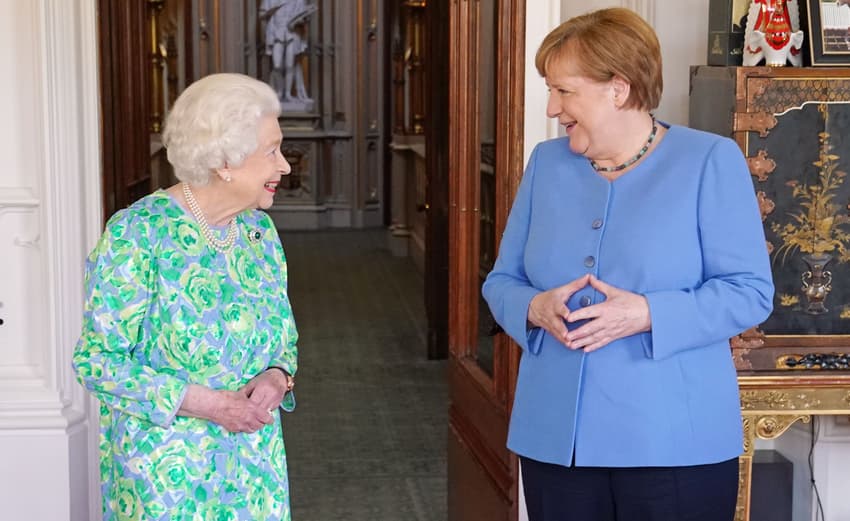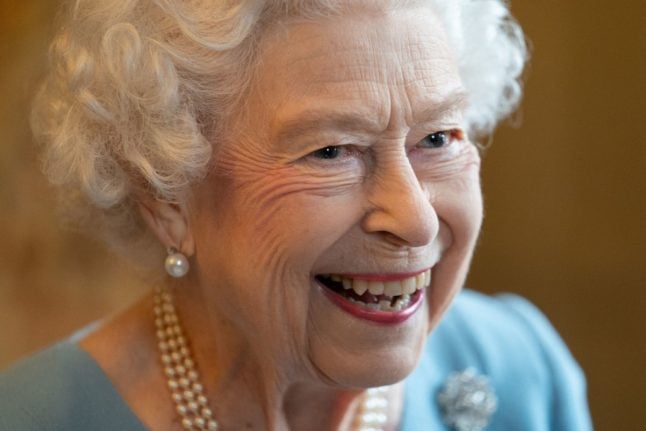What are the German roots of the British royal family?

The history of the British royal family is inextricably entwined with Germany, a heritage that will have pride of place during King Charles III's first state visit to the country beginning Wednesday.
Here is an overview of the Windsors' deep German roots.
READ ALSO: Germany rolls out red carpet for Charles III's first foreign visit
House of Saxe-Coburg and Gotha
If not for World War I, the British royal family would still go by a German name.
The House of Saxe-Coburg and Gotha stemmed from the marriage in 1840 of Queen Victoria to Albert, the scion of a modest royal dynasty from northeastern Bavaria.
Nearly eight decades later, their grandson George V disowned the cumbersome patronymic while his country was fighting Germany in the Great War.
In the face of increasingly hostile public opinion, the quintessentially British king decided to cut ties with Germany and adopted the name of a famous castle, the royal residence, near London.
The House of Windsor was born.
Religious strife and Christmas trees
The first German to be crowned King of Great Britain was George I in 1714.
Born into the House of Hanover in northern Germany, he did not speak English, and his accession to the throne was due solely to his religion: Catholics were excluded from the line of succession, and he was the closest Protestant relative of the late Queen Anne.
Queen Victoria was one of his descendants and after her marriage to Albert, the family changed its name from Hanover to Saxe-Coburg and Gotha.
The pair regularly wrote to each other in German.
The Prince Consort was credited with popularising the Christmas tree tradition. But above all, he became a 19th-century influencer by helping to organise the 1851 Great Exhibition, the first in a series of World's Fairs.
Grandmother of Europe
As the mother of nine children who produced countless offspring, Victoria forged family ties throughout Europe by marrying her children to scions of the continent's nobility.
Elizabeth II and Prince Philip, Charles's parents, were distant cousins, not least because of their hereditary ties to the woman who was dubbed the "grandmother of Europe".

Queen Elizabeth II during the celebrations for her Platinum Jubilee in 2022. Photo by Joe Giddens / POOL / AFP
"While there was a king in Britain, Spain or France, in Germany there were at least 30 regional rulers," Michael Hartmann, a sociologist specialising in elites at the Technical University of Darmstadt, told AFP.
"As they could only marry each other, the choice often fell on German nobles," with the result that "practically all European royal dynasties are related to the Germans", he said.
Hitler salute
In 2015, a rare photograph shocked the British public: It showed the young Elizabeth, aged six or seven, practising the straight-armed Hitler salute with her mother and sister, apparently encouraged by her uncle, Edward VIII.
The image was published by "The Sun" tabloid under the headline "Their Royal Heilnesses". It was taken from a never-before-published amateur film of about 20 seconds, shot in 1933 or 1934 at Balmoral Castle in Scotland.
The newspaper said the footage offered "a fascinating insight in the warped prejudices of Edward VIII", the precise nature of whose links to the Nazis is still debated in Britain.
Edward met Adolf Hitler in Germany in 1937, a year after he abdicated so he could marry a divorced American woman, Wallis Simpson.
A photograph shows him and his wife smiling radiantly and shaking hands with the Führer.
READ ALSO: Where are the German royal family now?
Reconciliation
Queen Elizabeth II was highly regarded in Germany, not least for her commitment to "German-British reconciliation after the horrors of World War II", as Chancellor Olaf Scholz recalled after her death last year.
The Queen first visited Berlin while it was cleaved by the Wall in 1965.
As a member of the German-Danish House of Schleswig-Holstein-Sonderburg-
King Charles III, who speaks German well, also seemed to have some affection for the homeland.
He has often visited the country, both officially and on discreet private stays.
Charles "has never denied his German ancestry", his distant cousin Prince Eduard von Anhalt told AFP. "Even if it is not very popular with many English people."
Comments
See Also
Here is an overview of the Windsors' deep German roots.
READ ALSO: Germany rolls out red carpet for Charles III's first foreign visit
House of Saxe-Coburg and Gotha
If not for World War I, the British royal family would still go by a German name.
The House of Saxe-Coburg and Gotha stemmed from the marriage in 1840 of Queen Victoria to Albert, the scion of a modest royal dynasty from northeastern Bavaria.
Nearly eight decades later, their grandson George V disowned the cumbersome patronymic while his country was fighting Germany in the Great War.
In the face of increasingly hostile public opinion, the quintessentially British king decided to cut ties with Germany and adopted the name of a famous castle, the royal residence, near London.
The House of Windsor was born.
Religious strife and Christmas trees
The first German to be crowned King of Great Britain was George I in 1714.
Born into the House of Hanover in northern Germany, he did not speak English, and his accession to the throne was due solely to his religion: Catholics were excluded from the line of succession, and he was the closest Protestant relative of the late Queen Anne.
Queen Victoria was one of his descendants and after her marriage to Albert, the family changed its name from Hanover to Saxe-Coburg and Gotha.
The pair regularly wrote to each other in German.
The Prince Consort was credited with popularising the Christmas tree tradition. But above all, he became a 19th-century influencer by helping to organise the 1851 Great Exhibition, the first in a series of World's Fairs.
Grandmother of Europe
As the mother of nine children who produced countless offspring, Victoria forged family ties throughout Europe by marrying her children to scions of the continent's nobility.
Elizabeth II and Prince Philip, Charles's parents, were distant cousins, not least because of their hereditary ties to the woman who was dubbed the "grandmother of Europe".

"While there was a king in Britain, Spain or France, in Germany there were at least 30 regional rulers," Michael Hartmann, a sociologist specialising in elites at the Technical University of Darmstadt, told AFP.
"As they could only marry each other, the choice often fell on German nobles," with the result that "practically all European royal dynasties are related to the Germans", he said.
Hitler salute
In 2015, a rare photograph shocked the British public: It showed the young Elizabeth, aged six or seven, practising the straight-armed Hitler salute with her mother and sister, apparently encouraged by her uncle, Edward VIII.
The image was published by "The Sun" tabloid under the headline "Their Royal Heilnesses". It was taken from a never-before-published amateur film of about 20 seconds, shot in 1933 or 1934 at Balmoral Castle in Scotland.
The newspaper said the footage offered "a fascinating insight in the warped prejudices of Edward VIII", the precise nature of whose links to the Nazis is still debated in Britain.
Edward met Adolf Hitler in Germany in 1937, a year after he abdicated so he could marry a divorced American woman, Wallis Simpson.
A photograph shows him and his wife smiling radiantly and shaking hands with the Führer.
READ ALSO: Where are the German royal family now?
Reconciliation
Queen Elizabeth II was highly regarded in Germany, not least for her commitment to "German-British reconciliation after the horrors of World War II", as Chancellor Olaf Scholz recalled after her death last year.
The Queen first visited Berlin while it was cleaved by the Wall in 1965.
As a member of the German-Danish House of Schleswig-Holstein-Sonderburg-
King Charles III, who speaks German well, also seemed to have some affection for the homeland.
He has often visited the country, both officially and on discreet private stays.
Charles "has never denied his German ancestry", his distant cousin Prince Eduard von Anhalt told AFP. "Even if it is not very popular with many English people."
Join the conversation in our comments section below. Share your own views and experience and if you have a question or suggestion for our journalists then email us at [email protected].
Please keep comments civil, constructive and on topic – and make sure to read our terms of use before getting involved.
Please log in here to leave a comment.